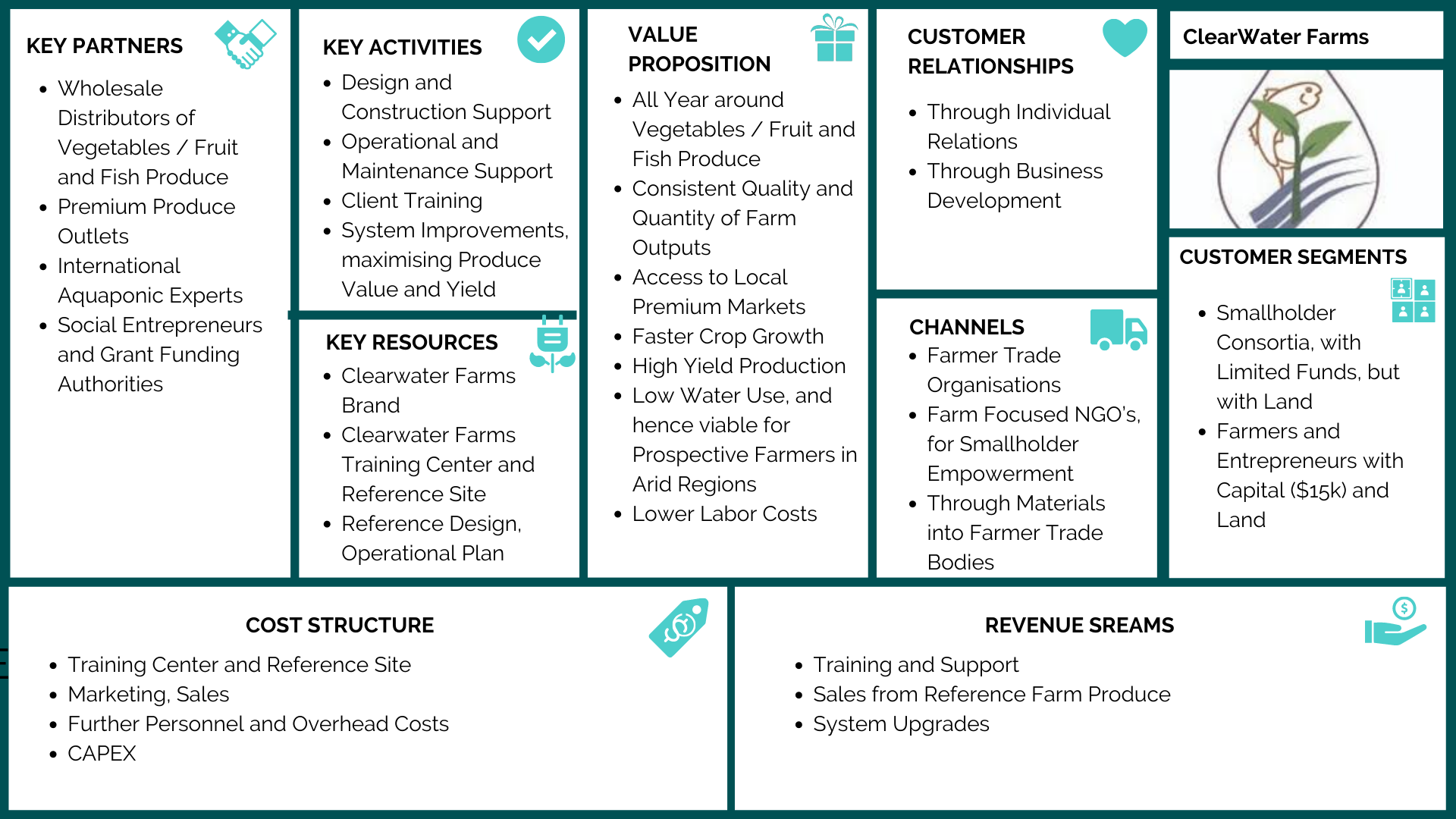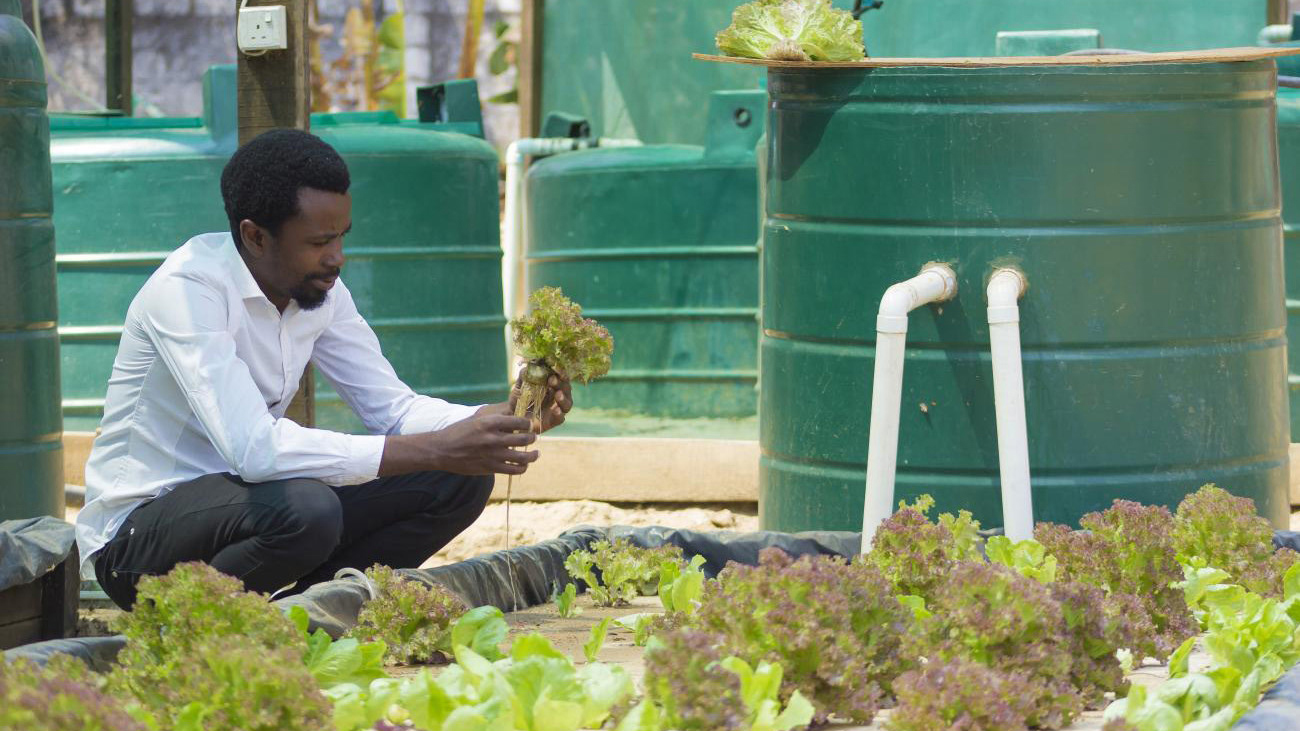"Thanks to our aquaponic systems, smallholders gain market access and generate additional income through water and nutrient-use efficient food production" (Steve Clark, Clearwater Farms)
Producing more food with less water
Clearwater Farms plans to improve the supply of produce in increasingly dry Sub-Saharan Africa through aquaponics, which combines the raising of fish in tanks with the cultivation of plants in water. Aquaponics is rain-independent, can use as much as 50% less water than drip irrigation and offers better yields than field-based farming. By enabling smallholders and farmer cooperatives in Zambia to consistently produce high-quality fish and horticulture for local premium markets, the venture aims to boost their skills and incomes and thus the economic prospects of their communities at large.
Challenge
Sub-Saharan Africa has recently experienced below-average rainfall due to climate change, resulting in below-average food supplies. Nearly 70% of the water taken from rivers and groundwater goes into agricultural irrigation. At the same time, demand for protein and fresh produce is rising within Sub-Saharan Africa’s population, which the United Nations expects to increase from 1.2 billion today to 2.5 billion by 2050. As traditional farming methods depend on reliable rainfall, other approaches are needed to avert famine.
Farmers in Zambia, a land-locked country, are unable to consistently deliver fresh high-quality produce due to poor irrigation, pests and limited access to adequate storage. Moreover, while fish is an important source of protein for most Zambians, annual capture fisheries’ output per person declined from 11.4 kg in the 1970s to 6.4 kg in 2003.
Entrepreneurial Approach and Innovation
Applicable in horticulture as well as aquaculture, aquaponics (AP) can deliver high-quality crops year-round as well as better yields than field-based farming. It also uses as much as 50% less water than drip irrigation systems and is independent of rainfall.
Clearwater Farms uses aquaponics for synergistic production of horticulture and fish. The enterprise buys from smallholders or cooperatives, helping them generate income and access local markets, and sells to supermarkets, hotels and restaurants. It also offers a return for investors who finance the development of the enterprise.
Clearwater Farms Business Model

Achievements
With the support of the ReSource Award, Clearwater Farms proofed its concept in the Zambian market and the reliability of its sales channels to end customers. The organisation provided trainings to small holders in the management and maintenance of the aquaponic systems. Clearwater Farms’ success contributed to increasing the interest and awareness of aquaponic farming in Zambia. The company was also exploring the production of oil crops in order to expand into other revenue-generating activities and scale its system. Clearwater Farms was working towards fulfilling the full potential of aquaponic farming in the region under the management of a local entrepreneur on the ground.
Success factors
There is a number of factors contributing to businesses long-term success. This business case has been honoured by the International ReSource Award program mainly due to the following success factors:
| Leadership skills | Important leadership skills are: | Clearwater Farms particularly stands out for the strong leadership skills and decisiveness of founder Steve Clark. |
| Stakeholder management competences | Important Stakeholder management competences are: | Clearwater Farms is known for its networking and communication skills because it maintains close relationships with smallholders and retailers. |
| Access to markets | Clearwater Farms provides smallholder farmers with access to markets. |
Apart from the success factors mentioned above, this start-up has been recognized by the Swiss Re Foundation because of its planning and review expertise and technical operation skills.
How ClearWater Farms is innovating its Business Model
One of the innovative aspects of ClearWater Farms is that it is raising the added value for all through bundling products and services from different smaller businesses. Check out the Innovation Strategy "Cluster to succeed" and find out more!
Video
Clearwater Farms Presentation Video. Source: ClearWater Farms

